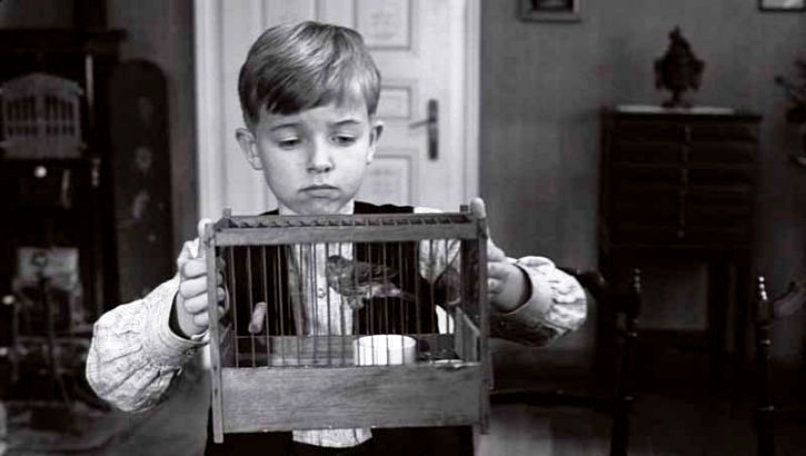
LES JEUX INTERDITS
Ten years after Paul Thomas Anderson’s Magnolia (1999), with its famous off-screen narrator trying to make sense out of a series of strange incidents, comes Michael Haneke’s celebrated The White Ribbon (2009). A very different film, but it still shares a lot of themes with Magnolia: namely those of upbringing, chance, and fathers betraying their children. In fact, the title of the TV show Philip Baker Hall’s character was hosting in Anderson’s movie could well serve as a tagline for marketing Haneke’s masterwork: “What Do Kids Know?”.
A small village in Northern Prussia is haunted by a series of violent incidents during the months immediately preceding the start of World War I. Someone stretches a tight rope between two trees, thus making the local doctor’s horse trip and severely injure the rider. Someone (else…?) kidnaps and mistreats the local Baron’s son, seemingly in an act of Old Testament-inspired revenge (Haneke quotes the same lines from the Bible that Anderson did in Magnolia). As those (and other) atrocious acts are being committed, the villagers nurture quiet mutual distrust.
Haneke’s main focus is the upbringing the children are receiving from their strict Protestant parents – frequent caning, sparse signs of affection, patriarchal structure of familial power, and finally, the use of the eponymous white ribbon, tied around a child’s arm to make him or her long for purity and innocence in the wake of a sin they committed.
Haneke made a gripping, monochromatic spectacle of a Protestant village clad in black, with its inhabitants perpetually composing themselves (not a hair sticks out on their heads, and Christian Friedel’s haircut will rival No Country for Old Men (2007) Javier Bardem’s in its sheer ridiculousness). In its quiet cruelty, it’s Haneke’s version of Day of Wrath (1943), where both human bodies and souls are imprisoned by the culture that stresses condemnation rather than redemption. The crucial difference, though, is that Haneke’s focus is on the children. „I gave God a chance to kill me” is a line of almost Shakespearian resonance, but – when delivered by a 10-year-old – it verges on spooky. The White Ribbon’s appeal is based on that very spookiness.
The portrayed community has its prophets, too, but their insights are ignored or misunderstood (Ordet [1955], anyone…?). Both the slightly retarded Karl (Kai-Peter Malina) and the frightened Ernan (Janina Fautz), who claims she had dreamt of all the terrible happenings before they occurred, seem to have something important to say, but the adults fail to listen. In fact, the incomprehensible blabber of Karl reminded me of the deaf-mute girl from the penultimate shot of Code Unknown (2000) – she, too, was desperate to communicate something, but lacked the language that anyone around would share with her. Just like Caché (2004), the movie is focused on the impact an unseen perpetrator has on family unit(s) caught off guard. Unlike in Funny Games (1997), the evil doesn’t give you its white-gloved hand to shake first. It stays in the shadows, defies exposure, and it radiates onto everyone involved, no matter how noble their (here: the teacher’s) intentions are.
I called The White Ribbon a masterwork, because that’s what I believe it is within Haneke’s oeuvre, but it doesn’t mean it ended or resolved my problems with Haneke himself. In fact, there are scenes (especially the “break-up scene” between the doctor and the midwife) in which one can feel the relish Haneke is taking in torturing his characters just for the sake it. Another scene, in which the Baron’s wife (Ursina Lardi) openly denounces the “malice and fear” pervading the village, is completely false in the light of the fact that Haneke did precious nothing to show anything but malice before, so those lines seem more like the voice of his repressed screenwriter’s conscience than a sign of any genuine concern.





You have a knack with turns of phrases! I especially like "evil doesn't give you its white-gloved hand to shake first. It stays in the shadows, defies exposure, and it radiates onto everyone involved".
ReplyDeleteThe review itself was pretty good too =D
[ichiosarius]: Glad you liked it!
ReplyDelete